人教英语选修7Unit4Sharing Reading(共21张PPT)
文档属性
| 名称 | 人教英语选修7Unit4Sharing Reading(共21张PPT) | 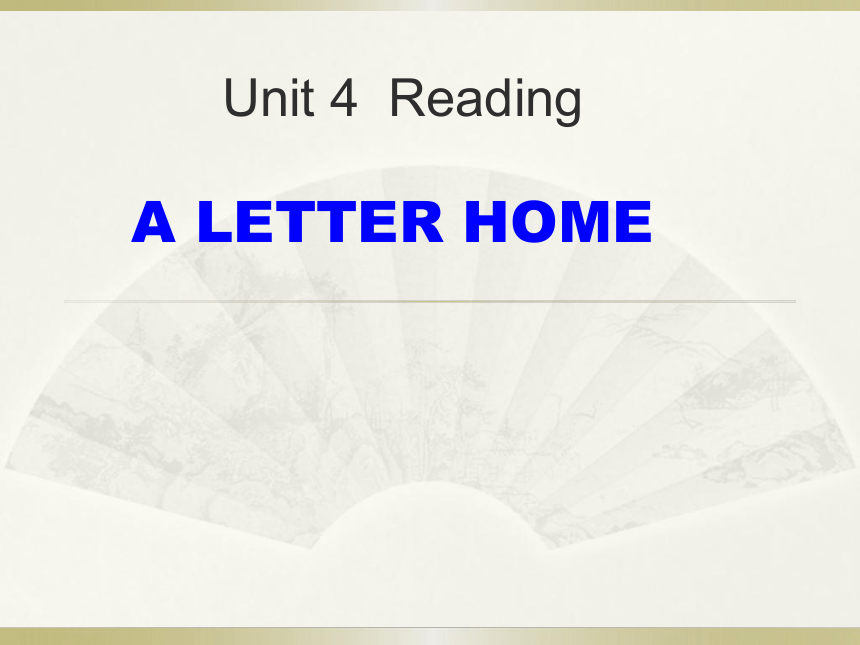 | |
| 格式 | zip | ||
| 文件大小 | 1.6MB | ||
| 资源类型 | 教案 | ||
| 版本资源 | 人教版(新课程标准) | ||
| 科目 | 英语 | ||
| 更新时间 | 2020-04-14 18:48:53 | ||
图片预览

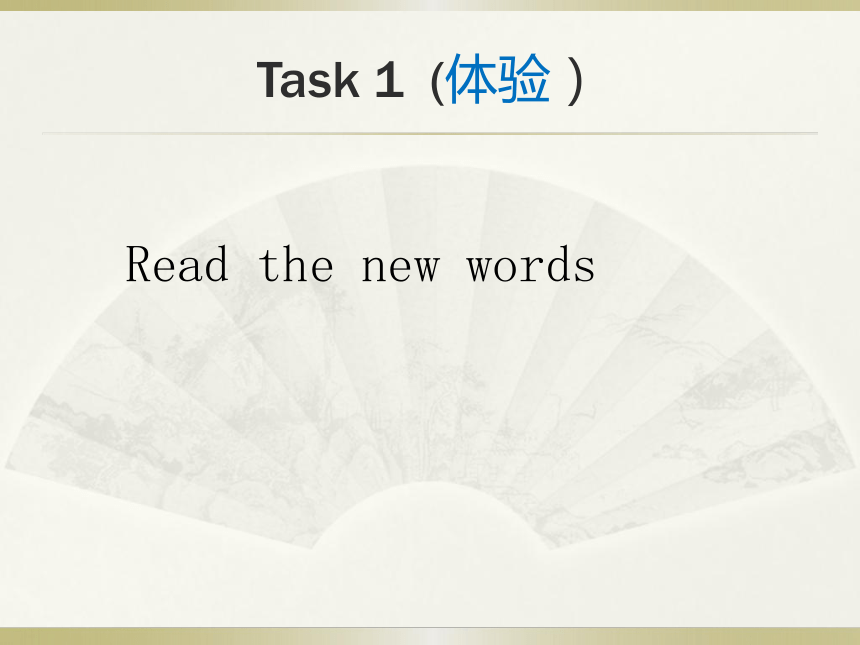
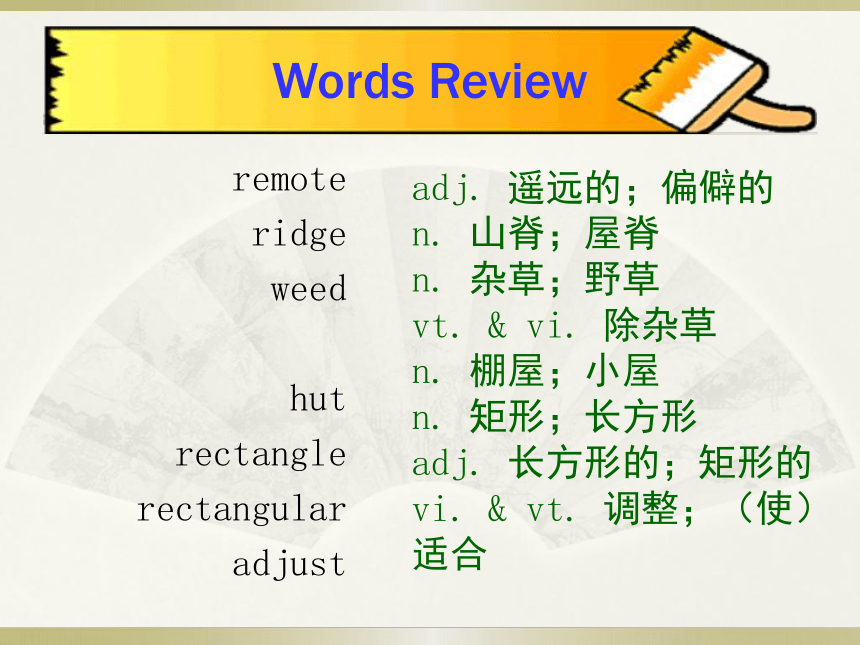
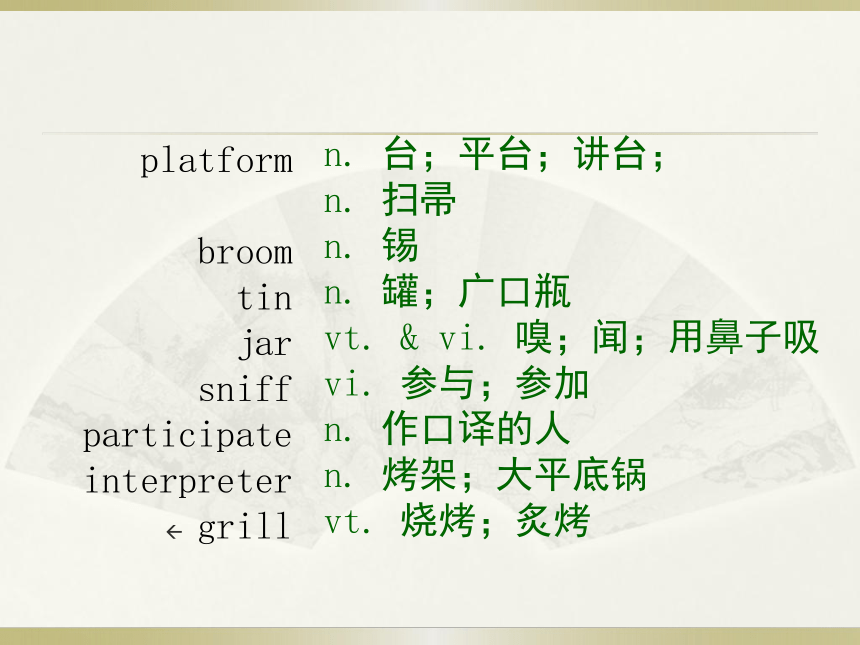
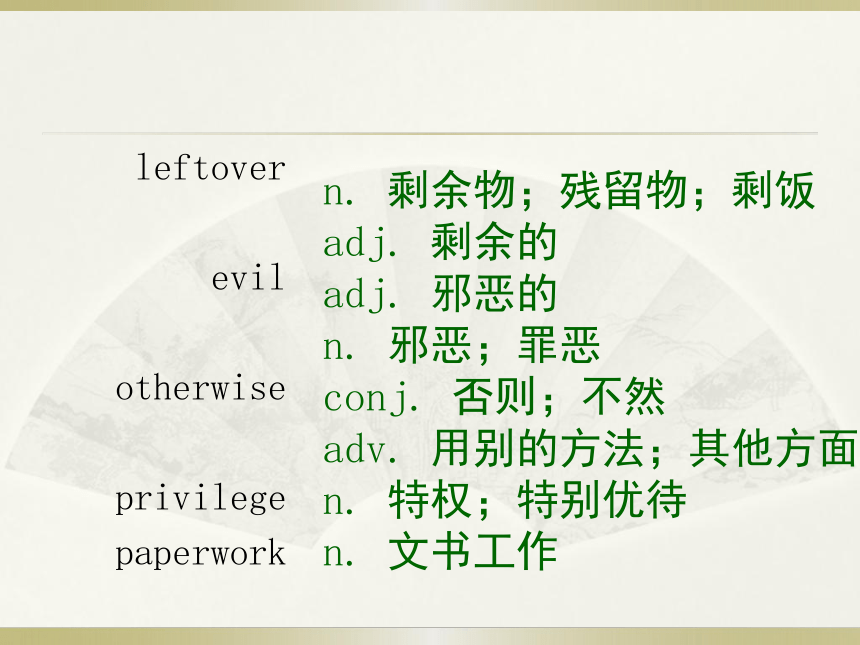
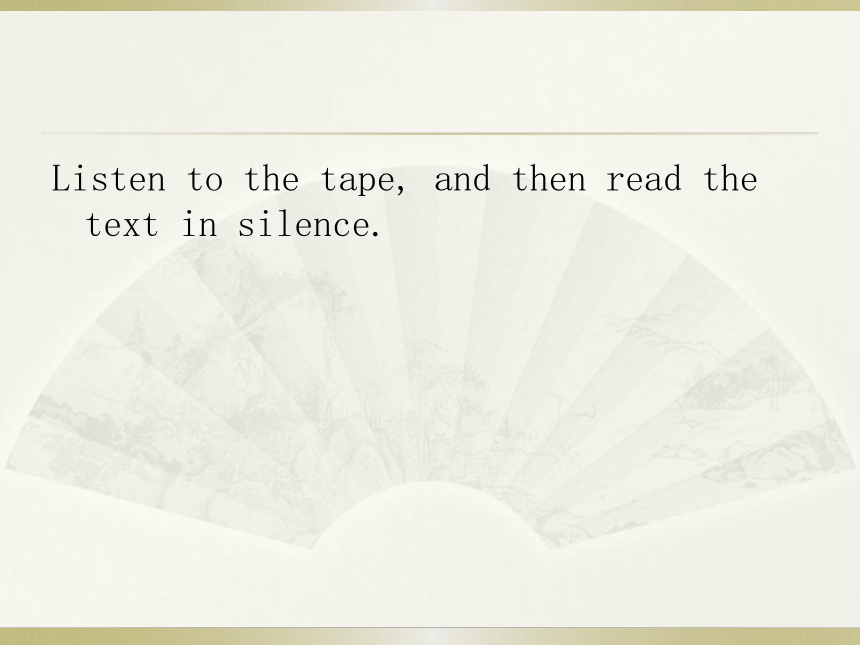
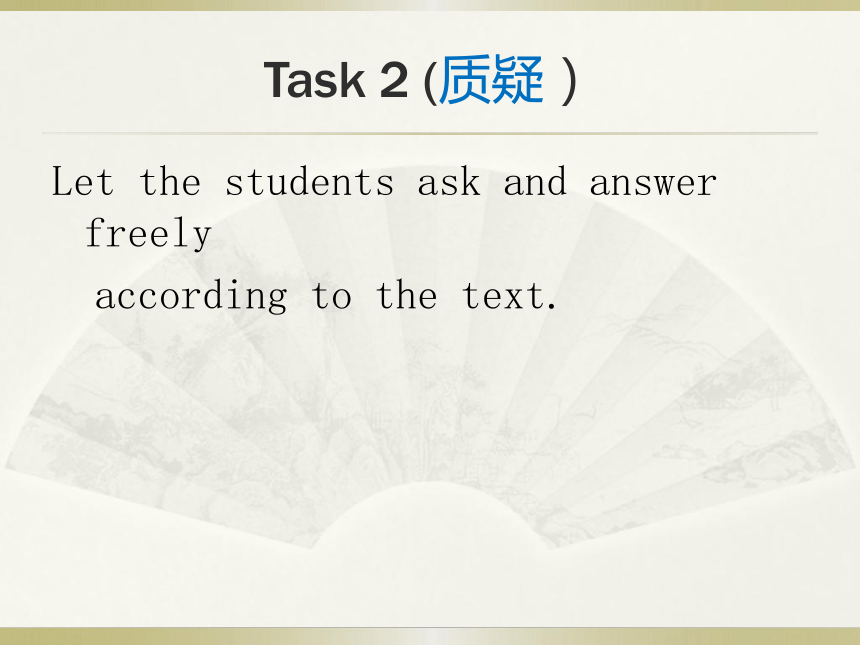
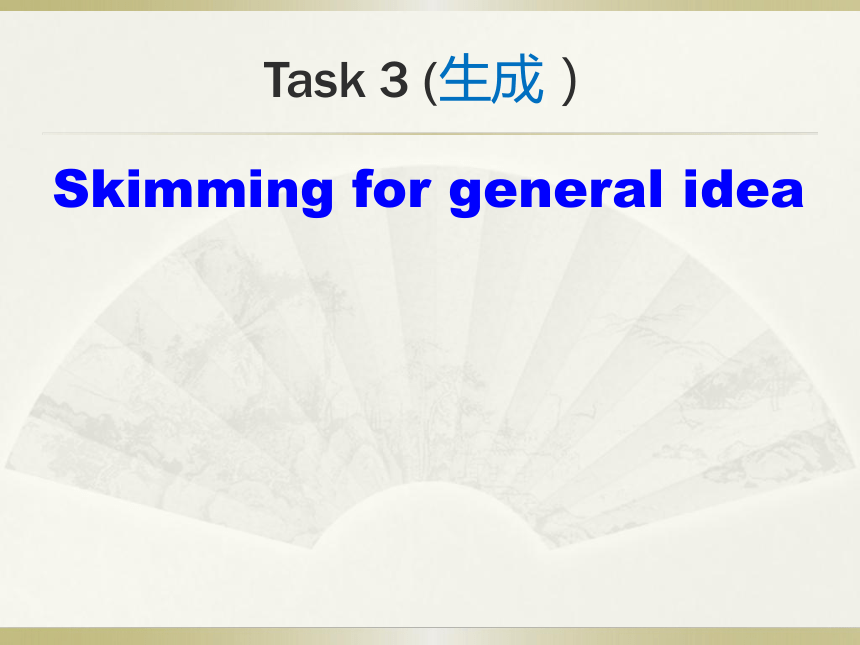

文档简介
(共21张PPT)
Unit 4 Reading
A LETTER HOME
Task 1 (体验)
Read the new words
remote
ridge
weed
hut
rectangle
rectangular
adjust
Words Review
adj. 遥远的;偏僻的
n. 山脊;屋脊
n. 杂草;野草
vt. & vi. 除杂草
n. 棚屋;小屋
n. 矩形;长方形
adj. 长方形的;矩形的
vi. & vt. 调整;(使)适合
platform
broom
tin
jar
sniff
participate
interpreter
grill
n. 台;平台;讲台;
n. 扫帚
n. 锡
n. 罐;广口瓶
vt. & vi. 嗅;闻;用鼻子吸
vi. 参与;参加
n. 作口译的人
n. 烤架;大平底锅
vt. 烧烤;炙烤
leftover
evil
otherwise
privilege
paperwork
n. 剩余物;残留物;剩饭
adj. 剩余的
adj. 邪恶的
n. 邪恶;罪恶
conj. 否则;不然
adv. 用别的方法;其他方面
n. 特权;特别优待
n. 文书工作
Listen to the tape, and then read the text in silence.
Task 2 (质疑)
Let the students ask and answer freely
according to the text.
Task 3 (生成)
Skimming for general idea
Reading Comprehension I
What’s the main idea of the text?
Jo wrote a letter to her friend Rosemary to talk about her experience as a volunteer teacher in Papua New Guinea.
Choose the beat answers
l. Why does Jo call the school where she
teaches a bush school?
A. Because the school was built in a bush.
B. Because the classrooms are made of
bamboo and the roofs of grass.
C. Because there is nothing but bush
around the school.
D. Because students in that school use
"bush" as their names.
2. Which of the following statements is true?
A. There is no electricity but enough
water at school.
B. I can become used to the school's
condition easily.
C. The students there often do chemistry
experiments.
D. We have neither textbooks nor any
experiment equipment.
3. The condition of Jo’s school is _____.
A. normal
B. first class
C. simple and rough
4. The attitude of Tombe’s family
towards Jo and Jenny’s visit is ______.
A. indifferent
B. enthusiastic
C. dislike
5. Which of the following sentences is
wrong about Mukap's house?
A. There were no windows and the
doorway was just big enough to get
through.
B. The hut was dark inside so it took
time for our eyes to adjust.
C. Fresh grass had been laid on the floor
but there was an old platform.
D. There was a fireplace in the centre of
the hut near the doorway.
Scanning for specific information
Complete the sentences with the characters
mentioned in the letter.
1. __________ was dying to hear all about
Jo’s life in Papua New Guinea.
2. ________ walked a long way to get to the
school.
3. ______________ didn’t have any textbooks.
4. ________ started jumping out of the
windows during a chemistry experiment.
5. ____________ visited a village that was
the home of one of the boys, Tombe.
6. ______ started crying “ieee ieee” to
welcome them.
7. _______ led us to a low bamboo hut.
8. ______ was going to share the platform
with Jenny and Jo.
9. ______________ softly talked to each
other in their language Jo didn’t
understand.
Try to divide the letter into four parts, and summarize what each part is about.
Part 1 (Para 1)
Introducing the topic — Jo’s life in PNG.
Jo’s school and her teaching work.
Part 3 (para 4—8)
Jo’s visit to Tombe’s home in the village.
Part 4 (para 9)
End of the letter.
Try to retell the story by using the key
words below.
otherwise possessions textbooks
adjust privilege relative
Jo works in a bush school — the classrooms
are made of bamboo and the roofs of grass. There’s no electricity or water and the students have even no _________. Last weekend, Jo visited Tombe’s home with another teacher.
.
拓展
The hut was dark inside so it took time for their eyes to ______. The only __________ that Jo could see were one broom, a few tin plates and cups and a couple of jars. Everyone in the village seemed to be a ________ of Tombe’s. They believe there are evil spirits that are usually attracted by leftover food. _________ they don’t waste anything. It was such a ________ to have spent a day with Tombe’s family.
homework
1. Read the passage again after class
and find all the attributive clauses
in it.
2. 发挥想象,连词成文(50-100字).
be relevant to, remote, the other day,
participate in, (be) dying to, adjust to,
hear from …, otherwise.
Unit 4 Reading
A LETTER HOME
Task 1 (体验)
Read the new words
remote
ridge
weed
hut
rectangle
rectangular
adjust
Words Review
adj. 遥远的;偏僻的
n. 山脊;屋脊
n. 杂草;野草
vt. & vi. 除杂草
n. 棚屋;小屋
n. 矩形;长方形
adj. 长方形的;矩形的
vi. & vt. 调整;(使)适合
platform
broom
tin
jar
sniff
participate
interpreter
grill
n. 台;平台;讲台;
n. 扫帚
n. 锡
n. 罐;广口瓶
vt. & vi. 嗅;闻;用鼻子吸
vi. 参与;参加
n. 作口译的人
n. 烤架;大平底锅
vt. 烧烤;炙烤
leftover
evil
otherwise
privilege
paperwork
n. 剩余物;残留物;剩饭
adj. 剩余的
adj. 邪恶的
n. 邪恶;罪恶
conj. 否则;不然
adv. 用别的方法;其他方面
n. 特权;特别优待
n. 文书工作
Listen to the tape, and then read the text in silence.
Task 2 (质疑)
Let the students ask and answer freely
according to the text.
Task 3 (生成)
Skimming for general idea
Reading Comprehension I
What’s the main idea of the text?
Jo wrote a letter to her friend Rosemary to talk about her experience as a volunteer teacher in Papua New Guinea.
Choose the beat answers
l. Why does Jo call the school where she
teaches a bush school?
A. Because the school was built in a bush.
B. Because the classrooms are made of
bamboo and the roofs of grass.
C. Because there is nothing but bush
around the school.
D. Because students in that school use
"bush" as their names.
2. Which of the following statements is true?
A. There is no electricity but enough
water at school.
B. I can become used to the school's
condition easily.
C. The students there often do chemistry
experiments.
D. We have neither textbooks nor any
experiment equipment.
3. The condition of Jo’s school is _____.
A. normal
B. first class
C. simple and rough
4. The attitude of Tombe’s family
towards Jo and Jenny’s visit is ______.
A. indifferent
B. enthusiastic
C. dislike
5. Which of the following sentences is
wrong about Mukap's house?
A. There were no windows and the
doorway was just big enough to get
through.
B. The hut was dark inside so it took
time for our eyes to adjust.
C. Fresh grass had been laid on the floor
but there was an old platform.
D. There was a fireplace in the centre of
the hut near the doorway.
Scanning for specific information
Complete the sentences with the characters
mentioned in the letter.
1. __________ was dying to hear all about
Jo’s life in Papua New Guinea.
2. ________ walked a long way to get to the
school.
3. ______________ didn’t have any textbooks.
4. ________ started jumping out of the
windows during a chemistry experiment.
5. ____________ visited a village that was
the home of one of the boys, Tombe.
6. ______ started crying “ieee ieee” to
welcome them.
7. _______ led us to a low bamboo hut.
8. ______ was going to share the platform
with Jenny and Jo.
9. ______________ softly talked to each
other in their language Jo didn’t
understand.
Try to divide the letter into four parts, and summarize what each part is about.
Part 1 (Para 1)
Introducing the topic — Jo’s life in PNG.
Jo’s school and her teaching work.
Part 3 (para 4—8)
Jo’s visit to Tombe’s home in the village.
Part 4 (para 9)
End of the letter.
Try to retell the story by using the key
words below.
otherwise possessions textbooks
adjust privilege relative
Jo works in a bush school — the classrooms
are made of bamboo and the roofs of grass. There’s no electricity or water and the students have even no _________. Last weekend, Jo visited Tombe’s home with another teacher.
.
拓展
The hut was dark inside so it took time for their eyes to ______. The only __________ that Jo could see were one broom, a few tin plates and cups and a couple of jars. Everyone in the village seemed to be a ________ of Tombe’s. They believe there are evil spirits that are usually attracted by leftover food. _________ they don’t waste anything. It was such a ________ to have spent a day with Tombe’s family.
homework
1. Read the passage again after class
and find all the attributive clauses
in it.
2. 发挥想象,连词成文(50-100字).
be relevant to, remote, the other day,
participate in, (be) dying to, adjust to,
hear from …, otherwise.
